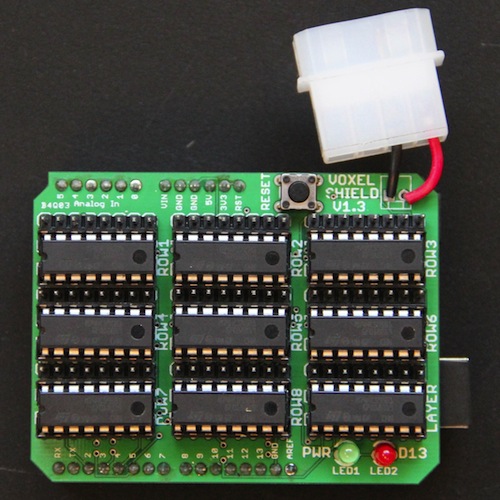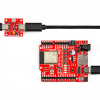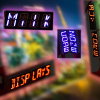First off, a quick announcement. This Thursday is Thanksgiving. SparkFun offices will be closed Thursday and Friday to give us time to stuff our faces reflect on the things for which we are thankful. We'll be back up to ludicrous speed on Monday. Today, however, we're going to talk about the Voxel Shield.
The Voxel Shield, developed by Connor Taylor, is an Arduino shield designed to give easy control of an 8x8x8 LED matrix. This shield uses nine shift registers in serial, eight of which act as positive outputs for the LEDs. The last shift register is connected to MOSFETs to act as grounding pins. To connect the LEDs, Connor used a method known Charlieplexing.
The results were pretty great. Connor is in the process of developing a Voxel Shield for commercial use. In the meantime, check out his website to find more information about the project! Great work, Connor!







Looking at his website, I only see straight-up multiplexing, not charlieplexing.
I considered it charlieplexing because the design relies on the LEDs blocking the current from flowing into other columns (edited; I originally said layers) the way charlieplexing relies on the LEDs blocking the current and forcing it to go into a specific LED.
Seems a bit of a stretch to me... According to the wikipedia page, Charlieplexing relies on the the specific capability of the Micro-controller pins, or whatever device you are using as a driver, to go into a high impedance and possibly reverse bias, to drive specific LEDS and prevent others from lighting. Maybe if you were using two pin bi-color LEDS and reverse bias to control what color lights up, then you could call it Charlieplexing, but in its current state I have to agree with Circuitsoft, and call it multiplexing. None the less though, a very cool project! Good work! I am inspired to build something similar now!
The shift registers are 3 state but nonetheless I suppose Circuitsoft was correct. Thanks for clearing that up.
May the Schwartz be with you!
A suggestion, I imagine the effect would improve if you dabbed a little bit of insulating black paint on the bottom of each LED to reduce the glow on the LEDs in layers above.
That's a great idea; I'll add it to the tutorial.
Ludicrous Speed? Just go straight to Plaid.
Plaid??? Are you insane??
...by the time they slow down, they will be clear into next week.
No!! Go straight to Tie-Dye!!!
Does that mean we have to comb the Sparkfun ‘desserts’ for Yogurt? - Colonel Sanders?
What?!@? WHY? I thought Sparkfun was about the community! I can't believe this! how dare they!
Can someone @ Sparkfun please let me know why Sparkfun is leaking my designs that I submitted to SFE as a widget for them to sell on their site?
I'm sorry - not sure what exactly you're talking about. The Voxel Shield was developed by Connor Taylor (aka Bunk). He submitted this design to us via our project call. We certainly didn't "leak" any designs.
Calm down, in science you are not guaranteed--even if you did something first--that someone else won't do the same thing and publish it faster. Emcee Grady probably saw this and didn't know about yours or something like that.
Hey Connor - great work! I would like to see the Voxel Shield to be commercially available ASAP. There is a lot cubes and some good insights on instructable, here is the URL: http://www.instructables.com/id/Led-Cube-8x8x8/?ALLSTEPS
It seems that the someone needs to some up with visual effects library, I also was wondering if someone working on some input sensors for the cube to respond dynamically, music may be?
Or even a Mind EEG headset - like Collin Cunningham's idea: Hmm. You could have your own BrainRave! :]
I am thankful for electronics, my dream job ^.^
EDIT: and music. And electronic music...